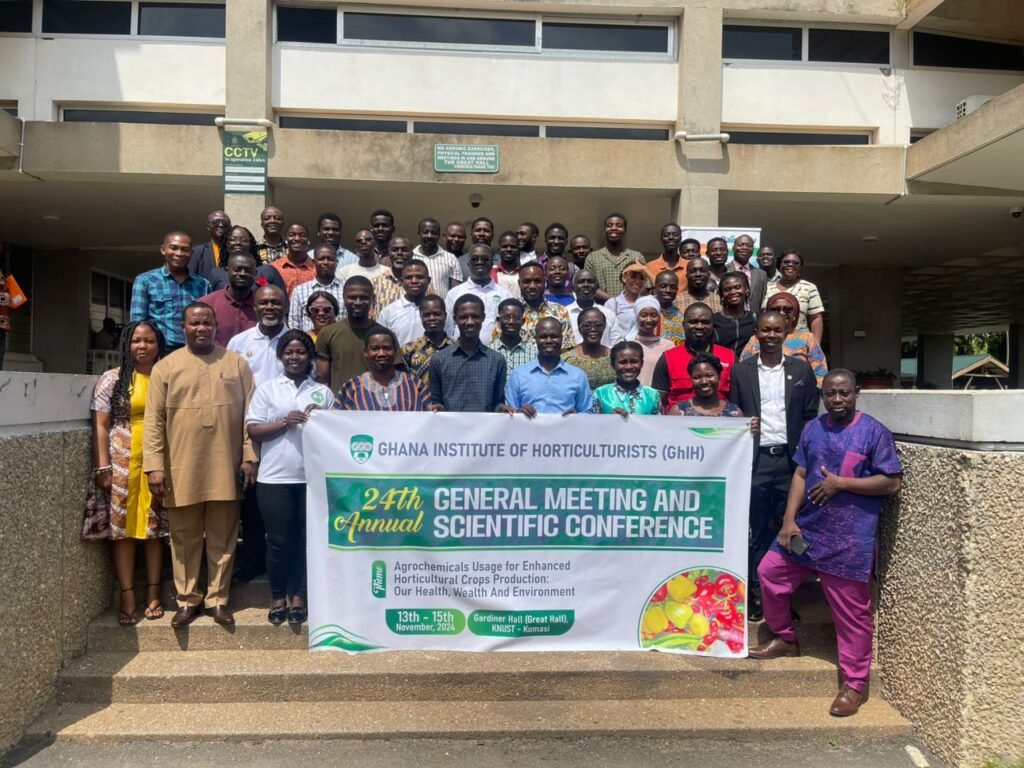The Ghana Institute of Horticulturists (GhIH) has expressed concern over the growing neglect of parks, medians of city roads, and urban landscapes, warning that the situation is negatively impacting environmental health in urban communities.
This caution was issued during the 24th Annual General Meeting and Scientific Conference of the Institute, held from November 13–15, at the Great Hall of Kwame Nkrumah University of Science and Technology (KNUST), Kumasi.
Speaking under the theme, “Agrochemicals Usage for Enhanced Horticultural Crops Production: Our Health, Wealth and Environment,” the GhIH emphasized the importance of these green spaces to urban environmental health.
“We draw the attention of Government to the growing neglect in the maintenance of parks, medians of city roads, and the general landscapes of towns and cities, which are critical for improving the environmental health of our urban communities,” the Institute stated, calling on both the government and private companies to partner with the GhIH to address this challenge. Several parks in the country’s capital such as the Efua Sutherland Park that provide recreational services are in a deplorable state. The most sought after, Legon Botanical Gardens is presently under renovation and the management of the University of Ghana has pledged to update the public on its reopening.
Protecting the Environment and Food Security
The GhIH expressed alarm at the ongoing degradation of the environment through activities such as illegal mining (galamsey) and improper agrochemical usage, which threaten food security and public health. The Institute called on the government to enforce policies and deploy resources to protect farmlands, forests, and water bodies while engaging local authorities to curb these destructive activities.

Strengthening Agencies and Ensuring Safe Agrochemical Usage
Highlighting the critical role of regulatory bodies like the Environmental Protection Agency (EPA) and the Food and Drugs Authority (FDA), the Institute lamented the challenges of inadequate staff and funding. It urged the government to bolster these agencies to ensure proper regulation of agrochemicals, eliminate the use of banned substances, and strictly enforce the guidelines for approved chemicals.
Boosting Horticulture and Reducing Imports
The Institute acknowledged the government’s efforts through initiatives such as Planting for Food and Jobs Phase II (PFJ 2.0) but advocated for a stronger focus on horticultural crops like tomatoes, onions, and carrots. “We call on Government to develop crop-specific policies for tomato, onion, and carrots to increase their production and processing to reduce their importation into the country,” the Institute urged, emphasizing that such measures could create jobs, especially for women and youth.
Supporting Research and Food Safety
The GhIH stressed the need for increased funding to universities and research institutions to enhance studies on agrochemical usage and food safety. Additionally, it encouraged agrochemical companies to invest in the training of agricultural extension agents and farmers to ensure the safe use of agrochemicals.
Collaboration and Representation
The Institute reiterated its readiness to collaborate with government and stakeholders to enhance the horticulture sector, calling for representation on the Horticultural Advisory Board of the Ministry of Food and Agriculture (MoFA). “As a matter of urgency, government should consider having representatives of the GhIH on the Horticultural Advisory Board to support the ministry in matters related to horticultural policies,” the communiqué stated.
The conference concluded with an appeal to all Ghanaians to prioritize food safety to protect public health and ensure the global competitiveness of Ghana’s horticultural exports.
Sponsors of the three-day event included Chemico Agrochemicals, Rainbow Agrosciences, and BioEnsure Limited, among others.








